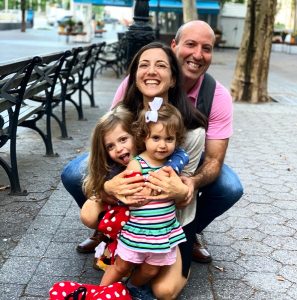My husband, Alberto Hazan, MD, and I are emergency physicians raising two daughters in Las Vegas. Florence is four years old, and Luisa Luna is two. We work for different groups, and we’ve both had to keep up with daily changes that occur at our hospitals and escalating levels of concern: concerns for our own safety and that of our colleagues, and concerns if there is a surge in critical patients. We’ve had discussions on what we would need to do if one of us or both of us are sick.
Our children, who also are experiencing changes around them—school closing, local playgrounds closing, and a new emphasis on cleanliness and hygiene—are adapting to changes very easily. If anything, I’ve learned from them how to be adaptive and smile through this process. Children are resilient, good natured, kind, and incredibly smart.
First, we talked about why school is closed, why the playground is closed, and why we are not getting together with our friends and family members. We’ve talked to them about germs and how they spread: “Right now there is a germ, a virus, that is very contagious, and we need to do our part to decrease the spread, so people don’t get sick.”
We ask them about what we do to stay healthy and prevent germs from spreading. We talk about properly washing our hands, and this has been fun for them. We count to 20 as we wash and often some numbers in the teens are skipped, so this can be an educational moment. Other times we sing happy birthday, or alternatively any Frozen song. My daughter has shown me how to wash my hands between each finger and on both sides; she loves to correct me when I’m not doing this properly.
They do ask us why, but then they willingly incorporate these new procedures into their daily lives. Unlike their parents and grandparents, who have never experienced something like this before, our children see this as a new normal, as an event that happens from time to time.
Our children are young enough that I don’t think they worry about our safety. At their age, I don’t want them to. They are aware that we care for sick patients at the hospital, and they take pride in that we serve in this role for our community. We’ve taught them that they are also doing their part by washing their hands, covering their sneezes, and keeping distance from others. This is how they can be community helpers, too.
We’ve told them to be the ones to remind us to shower right away when we get home. This puts them in charge. When I enter the house, I get immediate orders to go right upstairs to wash the germs from the hospital.
As emergency physician parents, one of the hardest parts has been worrying about bringing the virus home and potentially exposing our children. We have increased our level of hygiene in our house by separating our work clothes and showering before we do anything else in our home. Our shoes and other work equipment is left at work or in a separate area of our garage.
Being emergency physicians, we know we are exposed to illness, and there is always an inherent risk. We care for patients with HIV, AIDS, pertussis, tuberculosis, hepatitis, and influenza. We train to protect ourselves while still caring for our patients. With COVID-19, we have seen some of our colleagues become sick despite wearing proper protective equipment. There is uncertainty here, and an increased level of fear at work as we ration PPE and plan for a potential surge that we are already seeing in several parts of the country.
As I am writing this, our children are living with us. If one of us becomes sick, we will quarantine, and we have prepared for that.
We know that children prioritize exploration and play, and this has not stopped in our home. In between our hand hygiene lessons, we are finding opportunities to get dirty: This week we planted our garden. We finger paint and love to cook together. We take a lot of hikes.
We are grateful for time together at home where we can slow down and reflect on what is most important to us. While we worry about protecting them from COVID-19—both emotionally and physically—our children have served as a reminder to find joy in this moment.
Dr. Haber Hazan is an emergency physician in Las Vegas.
Pages: 1 2 | Multi-Page






One Response to “How We Are Talking to Our Kids About COVID-19”
August 23, 2021
JayGood morning, Dr. Hazan.
Thank you for your wonderful blog on COVID safety.
I posed these questions in a medical forum, but I am hoping to get your feedback. I am wondering if I may ask…
a) Having you be a part of the medical community, what is currently being done to keep pace with COVID mutations? b) How can we control such mutations in different areas, such as South America, Europe, and Africa?
c) I realize that viruses can adapt to different environments, but is there any way to keep such mutations from occurring that are harmful to humans?
d) Is there any way for the virus to mutate to become harmless?
Please be well, stay safe, and enjoy as much time with your family as much as possible before they all grow up.
Thank you.